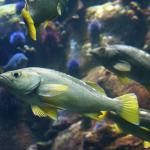More affordable aquatic foods could prevent 166 million micronutrient deficiencies worldwide

Boston, MA – Some 166 million micronutrient deficiencies could be averted by 2030 if the global production of marine and freshwater foods is increased by 15.5 million tons (8%), new research has found.
The study published by Nature highlighted several ways in which aquatic foods improve human health, including reducing micronutrient deficiencies and offering alternatives to red and processed meat, which are often associated with non-communicable disease.
Produced as one of five initial scientific papers for the Blue Food Assessment (BFA), the research, entitled “Aquatic foods to nourish nations,” found that an increase in the sustainable production of aquatic foods through investments in aquaculture and improved fisheries management would lead to a decrease in prices by 26%, making fish and seafood more affordable for low-income populations around the world.
“We live in a deeply malnourished world, with billions of people suffering from micronutrient deficiencies and diet-related chronic diseases,” said lead author Christopher Golden, assistant professor of nutrition and planetary health at Harvard T.H. Chan School of Public Health. “Finding ways to sustainably increase the production of blue foods offers an opportunity to increase access to safe, nutritious and healthy diets for the world’s most vulnerable.”
Aquatic foods offer the chance for developing countries to improve their diets without suffering the negative health risks associated with the meat-intensive diets of more affluent countries, the authors said.
“Aquatic foods can provide a potential pathway for nutritional equity,” said Zachary Koehn, early career fellow at the Center for Ocean Solutions, Stanford University. “Policymakers and development stakeholders should leverage the availability of culturally appropriate and sustainably produced aquatic foods to reduce food insecurity and tackle malnutrition.”
The findings are based on data from the Aquatic Foods Composition Database (AFCD), which was developed to increase understanding of the potential nutritional benefits of aquatic foods. It is now the most comprehensive global database of its kind, profiling 3,753 aquatic food species and hundreds of nutrients, with important implications for nutrition and fishery management policies across the world.
“For the first time, our study highlights the significant role of aquatic foods in meeting the dietary needs of nutritionally vulnerable populations, while also mitigating chronic diseases by weaning people away from red and processed meats,” Golden added.
For more information:
Chris Sweeney
617.432.8416
Visit the Harvard Chan School website for the latest news, press releases, and multimedia offerings.
